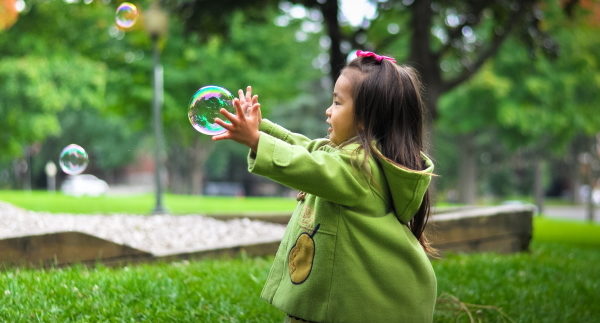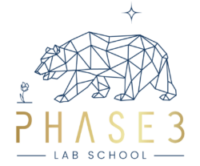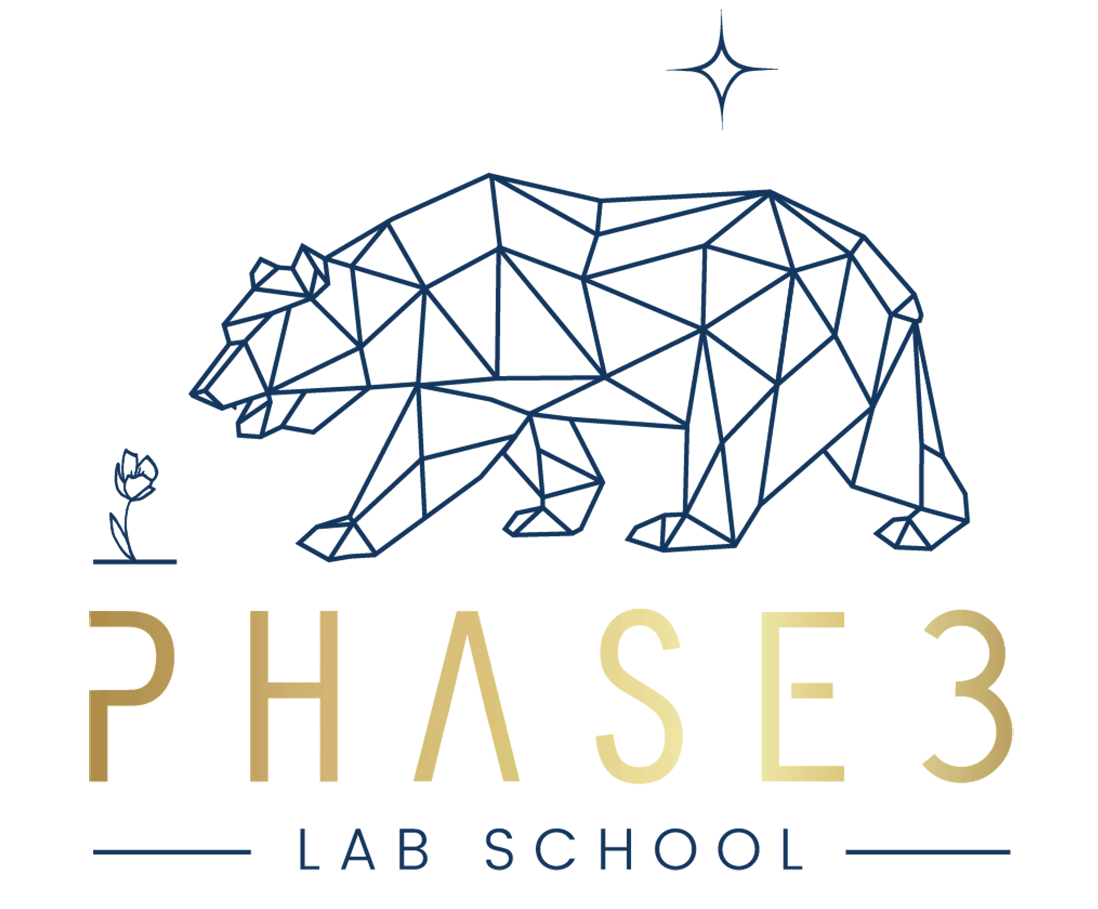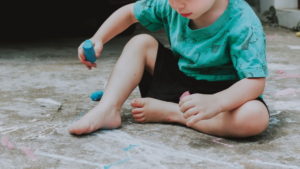The Phase3 Toddler Classroom is simpler and has a slower pace than its Pre-School rooms. Tables and chairs are smaller and the teacher-child ratio is lower (1:6 all the way to 36 months.) The atmosphere is positive, supportive and non-competitive – and includes a lot of singing and physical movement. The Phase3 Toddler materials are specifically structured to meet the developmental needs of toddlers and to support their need for purposeful activity. The Phase3 Toddler classroom focuses on two main areas, language development and the acquisition of skills for independence and social interactions, supplemented by select, simplified Sensorial materials.
Toddler age children have a special sensitivity for learning language they hear spoken around them. The Spanish Immersion Montessori Toddler Classroom offers many creative and evidence based linguistic methods to expand their growing vocabularies. Children interact with highly qualified teachers who physically get to your child’s eye level and speaks with her slowly and clearly, so that she can observe how the sounds are shaped by the teacher.
Children are continuously exposed to rich, clear, precise, varied and grammatically correct language which they then begin to use themselves. By participating in conversations, listening to stories, classifying objects and learning songs and poems, they nurture their budding language skills.
Between the ages of one and three, a toddler will go from speaking two-word phrases all the way to full sentences, using correct grammar. To reduce the typical frustration that toddlers feel when they don’t yet have the skill to share their needs and preferences, it’s important to support your toddler’s early language development, deliberately and methodically exposing your toddler to the specific language that she will need on a daily basis. This aspect of language learning is an important part of your child’s classroom experience.
As she learns to express her feelings and ideas through words, your toddler will experience less frustration and tantrums begin to decrease. In addition, our deliberate approach to language development prepares her for our Pre-School program, where your child will learn to read and write.
Older toddlers get introduced to phonetic awareness through activities that ask them to isolate and repeat beginning sounds of words—an advanced skill often taught in kindergarten in other settings!
With Spanish Immersion in the classroom and English language at home and environments outside school, Phase3 Toddlers are well on their way to becoming bilingual.
A toddler spends a significant amount of time to learn the skills that lead to self-sufficiency and independence from the need for constant adult help. Phase3 classrooms facilitate this development in several ways.
Special “practical life” exercises break down daily tasks into manageable steps, and promote repeated practice to achieve mastery. Toddlers are often in a frustrating position: they want to do things for themselves, but do not know how. Many tantrums can be avoided by enabling a child to do things for herself at a time when she is eager to do so.
We offer our toddlers endless opportunities to practice daily tasks – from washing a table to watering plants; from dressing themselves in simple clothes (including showing them how to put on a jacket using a trick we call the “Montessori throw,” where the child positions the jacket in front of her where she can see it, puts her hands into the sleeves, then flips the jacket over her head) to mastering buttons, bows and zippers. By performing one step at a time, a child is easily able to master new skills, giving her a great sense of personal achievement and pride.
A great example of the independence curriculum is our detailed snack routine. Parents are amazed that 2 ½ year olds can independently serve, jointly eat, and clean up after their daily snack.
Toilet Independence is another important aspect of a child’s journey to independence (and a requirement to enter Pre-School). Our skilled teachers watch for signs that your child is ready to use the toilet on her own and provide gentle encouragement for your toddler to have a positive toilet training experience. Older children often serve as role models for the younger members of the class and show the younger ones how to align to the rhythms and routines of the classroom. Our toilets are low to the ground and sized just right for your child to achieve another developmental milestone in a positive and relaxed environment.
Phase3’s master teachers guide your child to develop the foundational skills she needs to live together peacefully with other children and adults. We guide her to hang up her own jacket or apron, and put back a work in its proper place in the shelf. We encourage her to problem-solve rather than say “I can’t.” Because children this age have a strong tendency to imitate what they see, our teachers constantly model appropriate social skills, good manners and consideration for others. Our skilled teachers also show your child how to use words to identify the feelings they experience in themselves and that they see in others. In these ways we are able to help smooth their initial social interactions.
A significant portion of a toddler’s uncontrollable emotions (tantrums included) comes from not having the tools necessary to communicate their needs – and especially from being in an environment not suited to her needs. To reduce this frustration on a toddler’s part, our classrooms are child-sized – and, equally importantly, orderly. A child knows, every day, what to expect when – and where to find her favorite activity. We also offer her limited choices, so she can choose without being overwhelmed.
As your child grows, she has access to increasingly complex and challenging Montessori materials and activities. Each of these activities matches your child’s current developmental stage and help her to learn and experience fundamental skills such as cause and effect, problem solving, persistence and the completion of goals.
Increasingly sophisticated activities challenge and develop your toddler’s hand-eye coordination, gross motor skills, and the beginning of the fine motor skills that ultimately lead to more intricate exercises such as writing.
The freedom to move in the classroom and interact with peers is also guided by “grace and courtesy” lessons that help them to establish positive social interactions with classmates and teachers. Teachers continuously model the desired behavior and provide encouragement for positive behavior rather than correction for negative behavior.
With these lessons, children begin to develop the fundamentals of social and emotional intelligence that will be critical to their future success.
 The period from birth to three is the most critical in your child’s development and will impact the rest of her life. During this stage, your toddler absorbs and assimilates information at an astounding pace. It’s a once-in-a-lifetime opportunity and sets the trajectory for your child’s future. Phase3’s Montessori based Spanish Immersion Toddler Program provides your child with the ideal environment to make the most of this once-in-a-lifetime window of opportunity.
The period from birth to three is the most critical in your child’s development and will impact the rest of her life. During this stage, your toddler absorbs and assimilates information at an astounding pace. It’s a once-in-a-lifetime opportunity and sets the trajectory for your child’s future. Phase3’s Montessori based Spanish Immersion Toddler Program provides your child with the ideal environment to make the most of this once-in-a-lifetime window of opportunity.


 Able to absorb language from his environment – learning even big words and other languages easily and with pleasure – and becomes happier as he learns the words to express his needs, rather than relying on crying or tantrums to communicate.During this stage, Toddlers are uniquely able to learn and process multiple languages. Phase3’s Full Spanish Immersion Montessori program is conducted by highly trained teachers. The effortless acquisition of a second language (or even 3rd or 4th) is a gift that brings a lifetime of cognitive and health benefits.
Able to absorb language from his environment – learning even big words and other languages easily and with pleasure – and becomes happier as he learns the words to express his needs, rather than relying on crying or tantrums to communicate.During this stage, Toddlers are uniquely able to learn and process multiple languages. Phase3’s Full Spanish Immersion Montessori program is conducted by highly trained teachers. The effortless acquisition of a second language (or even 3rd or 4th) is a gift that brings a lifetime of cognitive and health benefits.